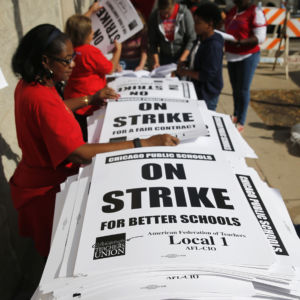Editor’s Note: For another viewpoint on this topic, see Severance Pay — Corporate Obligation to Long-Term Workers
It is an annual ritual on Labor Day for union officials and boosters to demand a rewrite of U.S. labor law to strengthen unions. They believe that workers who voluntarily choose to not join unions do not know what is best for themselves. All that is needed is “reform” that imposes union representation on workers, thereby making all workers better off.
In reality, though, workers do know what is in their best interest, and often times that is to take a pass on joining a union because they simply do not value the services unions offer. As seen from the AFL-CIO’s latest annual financial disclosure form, it spends $10 million more on politics than actually representing workers. And nearly all labor union political spending goes to left-leaning organizations. For moderate- or right-leaning workers, why would you want to join an organization that throws millions of dollars at politics with which you disagree?
But there is another explanation for abysmal membership numbers. Recent research shows labor unions have failed to devote the necessary resources to persuade workers to join a union. In written testimony before the House Education and Labor Committee, the HR Policy Association’s Roger King found union petitions for election declined by nearly 63 percent from 1997 to 2017. In other words, as the amount of workers available to organize in the private-sector have increased, the number of union elections have decreased dramatically. Before changing labor laws, unions need to change their own priorities and expend more funds toward organizing and recruiting new members.
Yet, labor unions have chosen to wield their political influence to urge Congress and regulators to overhaul labor law so that union representation is forced on workers and individuals must pay for union services they don’t want.
However, the proof in the pudding. Even this strategy is not working.
During the Obama administration, where the National Labor Relations Board, the primary federal agency governing private-sector labor relations, overturned a collective 4,559 years of precedent, with nearly all of the changes advantaging organized labor, the total amount and rate of union membership declined. In 2009, 15.3 million individuals belonged to a union. By 2016, only 14.5 million workers were members of a union, according to unionstats.com. The percent of employed workers who were union members dropped from 12.3 percent to 10.7 percent over the same time span.
And the way union officials want to rewrite labor laws is unlikely to win over workers who are already skeptical of joining a union. Democrats and unions have united around the Protecting the Right to Organize Act of 2019 (PRO Act), that would radically overhaul U.S. labor relations law to facilitate labor union organizing without regard to the negative consequences on workers, consumers, employers and the economy.
In particular, workers will likely question the need for the PRO Act provision that puts their private information at risk. Under this bill, whenever a union petitions for an election at a workplace, the employer will be compelled to hand over employees’ contact information to union organizers, including personal cell phone numbers, email addresses and work schedules, without any opportunity for workers to opt out of their employers sharing their personal data with third parties.
Worker choice is also taken away. The PRO Act would repeal a section of the National Labor Relations Act that permits states to enact Right-to-Work laws and would require all workers to pay union fees as a condition of employment or risk termination. Currently, 27 states have adopted Right-to-Work laws, which in some cases have been on the books since the 1940s.
Repealing these laws is particularly sinister because workers who vote against or inherit a union are forced to accept union representation. Under U.S. labor law, once a union wins an election, they represent members and non-members. Non-members lose all rights to represent themselves, and the PRO Act would force them to pay for this union representation with which they want nothing to do.
Forcing union representation on workers is not the answer to Big Labor’s woes. It needs to modernize and provide services workers would voluntarily pay for just like every other organization. Until this happens, union membership will continue to decline. And union officials will have no one else to blame but themselves.

